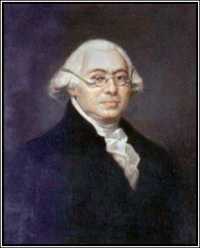Debate of Executive Power (June 1)
- Mr. PICKNEY
- was for a vigorous Executive but was afraid the
Executive powers of the existing Congress might extend to peace
and war and etc., etc., which would render the Executive a
monarchy, of the worst kind, to wit an elective one.

- Mr. WILSON
- moved that the Executive consist of a single
person.
- Mr. C. PICKNEY
- seconded the motion,so as to read "that
a National Executive to consist of a single pon, be instituted."
A consirable pause ensuing and the Chairman asking if he
should put the question,
- Dr. FRANKLIN
- observed that it was a
point of great Importance and wished that the gentlemen wouid
deliver their sentiments on it before the question was put.
- Mr. RUTLEDGE
- animadverted on the shyness of gentlemen on
this and other subjects. He said it looked as if they supposed
themselves precluded by having frankly disclosed their opinions
from afterwards.changing them, which he did not take to be at
all the case. He said he was for vesting the Executive power in a
single person, though he was not for giving him the power of
war and peace. A single man would feel the greatest responsibility and administer the public affairs best.
- Mr. SHERMAN
- said he considered the Executive magistracy as
nothing more than an institution for carrying the will of the
legislature into effect, that the person or persons ought to be
appointed by and accountable to the legislature only, which was
the depository of the supreme will of the Society. As they were
the best jndges of the business which ought to be done by the
Executive department, and consequently of the number necessary
from time to time for doing it, he wished the number might not
be fixed, but that the legislature should be at liberty to appoint
one or more as experience might dictate.
- Mr. WILSON
- preferred a single magistrate, as giving most
energy dispatch and responsibility to the office. He did not
consider the Prerogatives of the British Monarch as a proper
guide in defining the Executive powers. Some of these prerogatives were of a legislative nature. Among others that of war and
peace etc., etc. The only powers he conceived strictly Executive
were those of executing the laws, and appointing officers, not
appertaining to and appointed by the Legislature.
- Mr. GERRY
- favored the policy of annexing a Council to the
Executive in order to give weight and inspire confidence.
- Mr. RANDOLPH
- strenuously opposed a unity in the Executive
magistracy. He regarded it as the fetus of monarchy. We had he
said no motive to be governed by the British Government as our
prototype. He did not mean however to throw censure on that
Excellent fabric. If we were in a situation to copy it he did not
know that he should be opposed to it; but the fixed genius of the
people of America required a different form of Government.
He could not see why the great requisites for the Executive
departement, vigor, despatch and responsibility could not be found
in three men, as well as in one man. The Executive ought to be
independent. It ought therefore in order to support its independence to consist of more than one.
- Mr. WILSON
- said that unity in the Executive instead of being
the fetus of monarchy would be the best safeguard against
tyranny. He repeated that he was not governed by the British Model
which was inapplicable to the situation of this Country; the
extent of which was so great, and the manners so republican,
that nothing but a great confederated Republic would do for it.

- Documents >
- 1786-1800 >
- The Constitutional Convention debates and the Anti-Federalist
Papers >
- James Madison to George Washington (April 16, 1787)
- The Virginia Plan (May 29)
- Debate on Representation (May 31)
- Debate of Executive Power (June 1)
- Opposition to Executive Salaries (June 2)
- Opposition to a Unitary Executive (June 4)
- Electing Representatives (June 6)
- Debate on Method of Electing Senators (June 7)
- Debate on Veto of State Laws (June 8)
- The New Jersey Plan (June 15)
- Debate on The New Jersey Plan (June 16)
- Plan for National Government (June 18)
- Opposition to The New Jersey Plan (June 19)
- Debate on Federalism (June 21)
- Length of Term in Office for Senators (June 26)
- Debate on State Equality in the Senate (June 28-July 2)
- Majority Rule the Basic Republican Principle (July 5, 13, 14)
- Election and Term of Office of the National Executive (July 17, 19)
- The Judiciary, the Veto, and Separation of Powers (July 21)
- Appointment of Judges (July 21)
- Method of Ratification (July 23)
- Election of Executive (July 24, 25)
- First Draft of the Constitution (August 6)
- Qualifications of Suffrage (August 7, 10)
- Citizenship for Immigrants (August 9)
- Executive Veto Power (August 15)
- Slavery and Constitution (August 21, 22)
- Election and Powers of the president (Sept. 4, 5, 6)
- Opposition to the Constitution (Sept. 7, 10, 15)
- Signing the Constitution (Sept. 17)
- Speech of James Wilson (October 6, 1787)
- "John De Witt" Essay I, Oct.22, 1787
- "John De Witt" Essay II, Oct.27, 1787
- Speech of Patrick Henry (June 5, 1788)
- Amendments Proposed by the Massachusetts Convention,(Feb. 7, 1788)
- Amendments Proposed by the Virginia Convention, (June 27, 1788)
- Amendments to the Constitution (June 27, 1788)
- Amendments Proposed by The Rhode Island Convention (March 6, 1790)
- Speech of Patrick Henry (June 7, 1788)

